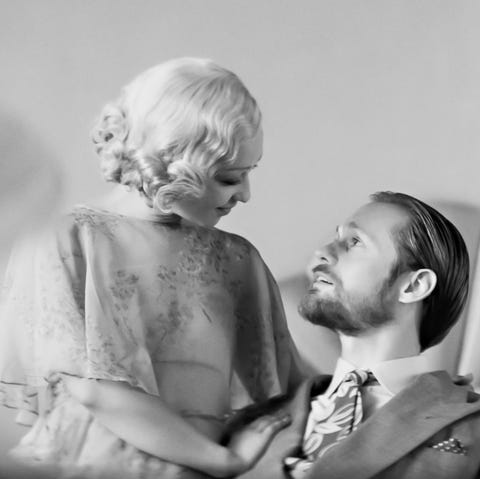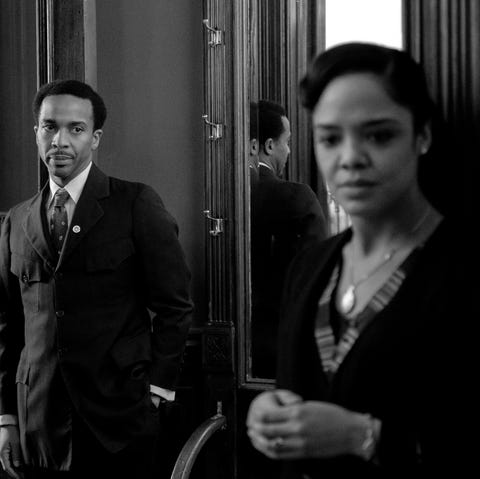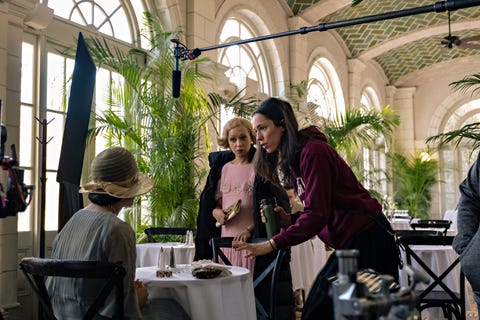Passing opens on a busy street in 1920s New York. A mysterious woman (Tessa Thompson) is roaming through Manhattan. In this part of town, she anxiously hides behind a wide-brimmed hat covering half her face. It’s every bit intentional. When she later settles down in the grand tea room at The Drayton Hotel, she stays camouflaged among a sea of lily-white couples. As she people-watches, her eyes lock on an almost unnoticeable old friend, Clare Kendry (Ruth Negga), who blends in perfectly with the crowd.
In her directorial debut, Rebecca Hall takes on an ambitious adaptation of Passing, a 1929 novel written by Harlem Renaissance author Nella Larsen about two Black women who live parallel truths: one, Clare, is passing as white, and the other, Thompson’s Irene, envies the privileges that come with the act. When it first premiered at the 2021 Sundance Film Festival, Passing was touted as a “psychological thriller about obsession, repression, and the lies people tell themselves and others to protect their carefully constructed realities.” But the film is less potent than its subject matter. Instead, race identity in America is a soft whisper that is meant to haunt instead of educate.
Though both of these light-skinned Black women have shared a similar upbringing, Irene and Clare could not have grown further apart. Irene lives in Harlem with her two children and charming husband (André Holland), who is Black. Clare has dyed her hair blonde and lives partially in Europe with her daughter and racist husband (Alexander Skarsgård), who is white. After catching up over champagne in Clare’s suite, the dynamic between the two women tightens, emphasized by the enclosing camera shots. While Clare seems delighted to be reunited with an old friend, Irene appears hesitant and reserved. It doesn’t make Irene any more comfortable when Clare says dating a rich white man is “well worth the price,” implying that she’s comfortable passing as a white woman and benefiting from it. Or when Clare’s husband walks in, expressing his gratitude for Clare’s “whiteness.” Irene soon realizes that her childhood friend was now someone with a secret, because the man who hates Black people so much did not realize his wife was one.
Passing sits in the discomfort, where claiming Blackness is done with reluctance; the malaise hovers over the characters in their interactions with white people and lingers when briefly discussed amongst each other. In many ways, Hall depicts that actions of racial prejudice are not always the most obvious ones.
Negga’s performance as Clare, like her characterization in the novel, is charismatic and intoxicating, so much so that she snakes her way into Irene’s life, desperate for friendship and access to a community she abandoned. When Clare attends her first party back in Harlem, all the guests circle around her orbit. She demands to be known. Clare exudes this magnetism, from how she glides across a room to her nonchalant smize.
Thompson delivers one of her greatest roles to date: an uptight, sometimes white-passing woman who cannot seem to reveal much about herself. Irene is proper and politically correct; she barely discusses race unless provoked by her husband, and feels insecure in her identity, which is magnified by her sudden encounter with Clare. As she starts getting ready for a party, her eyes fixed on her vanity mirror, she questions her husband about Clare. Though she doesn’t make direct eye contact with him, she implies that he’s attracted to Clare, as if he knew what he was doing, and Irene grows irritated. Her jealousy spirals, yet it is not strong enough for her to let go of her undefined bond with Clare, probably because Irene cannot resist her either. But, it is hard to tell when Thompson’s character barely addresses how she is feeling, which is why some of her actions muddle. Irene spends the first few acts avoiding confrontation; she lets chaos unravel in front of her eyes, like how Clare strolled into her life without question. Clare and Irene embody many of the topics this film attempts to address—such as racial identity, insecurity, and envy—but at times, the silent gazes are all that they are: gazes in white noise.
Spanish cinematographer Edu Grau shoots in a black-and-white portrait style and classic 4:3 aspect ratio, creating a lush, dreamlike world that juxtaposes with the intense dialogue. Every shot looks like you’re sifting through a cloud or a memory. In collaboration with production designer Nora Mendis, costume designer Marci Rodgers, and composer Dev Hynes, the team recreated Harlem in the ‘20s while making it feel tangible today. Although it creates the illusion that you’re floating while following these characters, it tricks you into a comfortable solace—until it doesn’t. The ending scenes, for example, offer an intriguing twist worth untangling that instead feels rushed compared to its usual slow burn.
From the start, the unlikely friendship between Irene and Clare is compelling enough due to its complexity and sexual tension that never fully unfurls. While race might be the premise of the film, there’s an underlying jealousy between both women that carries the plot forward. Clare wants to be submerged into Black culture; Irene resents the dangers of it. When Irene’s husband mentions a recent lynching incident to his sons, Irene hurries over to say “not now.” They’re not ready, she implies. This is the extent the film allows itself to overtly discuss racial violence. Passing is aware of its subtlety and commits its loudest dialogues to physical mannerisms and body language. It thrives in a space for the characters to execute those longing stares and passive aggressive comments. Some might not find it to be enough.
Rebecca Hall’s provocative directorial debut is not an easy story to pull off, but once it lures you into a haze, you’ll catch yourself thinking about how the world it creates in the 1920s is not, in fact, so different from the one we live in now.
This content is created and maintained by a third party, and imported onto this page to help users provide their email addresses. You may be able to find more information about this and similar content at piano.io



